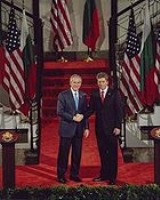
Bulgarian-American relations
Encyclopedia
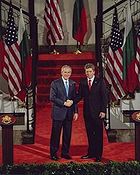
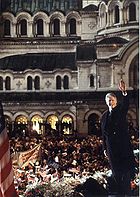
United States
The United States of America is a federal constitutional republic comprising fifty states and a federal district...
support for Bulgaria
Bulgaria
Bulgaria , officially the Republic of Bulgaria , is a parliamentary democracy within a unitary constitutional republic in Southeast Europe. The country borders Romania to the north, Serbia and Macedonia to the west, Greece and Turkey to the south, as well as the Black Sea to the east...
n independence in the late 19th century to the growth of trade and commerce in the early 20th century, to reluctant hostility during World War I
World War I
World War I , which was predominantly called the World War or the Great War from its occurrence until 1939, and the First World War or World War I thereafter, was a major war centred in Europe that began on 28 July 1914 and lasted until 11 November 1918...
and open war and bombardment in World War II
World War II
World War II, or the Second World War , was a global conflict lasting from 1939 to 1945, involving most of the world's nations—including all of the great powers—eventually forming two opposing military alliances: the Allies and the Axis...
, to ideological confrontation during the Cold War
Cold War
The Cold War was the continuing state from roughly 1946 to 1991 of political conflict, military tension, proxy wars, and economic competition between the Communist World—primarily the Soviet Union and its satellite states and allies—and the powers of the Western world, primarily the United States...
, to partnership with the United States in the North Atlantic Treaty Organization (NATO) and growing political, military and economic ties in the beginning of the 21st century.
Country comparison
 Bulgaria BulgariaBulgaria Bulgaria , officially the Republic of Bulgaria , is a parliamentary democracy within a unitary constitutional republic in Southeast Europe. The country borders Romania to the north, Serbia and Macedonia to the west, Greece and Turkey to the south, as well as the Black Sea to the east... |
 United States United StatesUnited States The United States of America is a federal constitutional republic comprising fifty states and a federal district... |
|
|---|---|---|
| Population | 7,606,551 | |
| Area | 110,910 km² (42,823 sq mi) | 9,826,630 km² (3,794,066 sq mi ) |
| Population Density | 68.9 /km² (185 /sq mi) | 31/km² (80/sq mi) |
| Capital | Sofia Sofia Sofia is the capital and largest city of Bulgaria and the 12th largest city in the European Union with a population of 1.27 million people. It is located in western Bulgaria, at the foot of Mount Vitosha and approximately at the centre of the Balkan Peninsula.Prehistoric settlements were excavated... |
Washington, D.C. Washington, D.C. Washington, D.C., formally the District of Columbia and commonly referred to as Washington, "the District", or simply D.C., is the capital of the United States. On July 16, 1790, the United States Congress approved the creation of a permanent national capital as permitted by the U.S. Constitution.... |
| Largest City | Sofia Sofia Sofia is the capital and largest city of Bulgaria and the 12th largest city in the European Union with a population of 1.27 million people. It is located in western Bulgaria, at the foot of Mount Vitosha and approximately at the centre of the Balkan Peninsula.Prehistoric settlements were excavated... - 1,402,471 (1,449,277 Metro) |
New York City New York City New York is the most populous city in the United States and the center of the New York Metropolitan Area, one of the most populous metropolitan areas in the world. New York exerts a significant impact upon global commerce, finance, media, art, fashion, research, technology, education, and... - 8,363,710 (19,006,798 Metro) |
| Government | Parliamentary republic Parliamentary republic A parliamentary republic or parliamentary constitutional republic is a type of republic which operates under a parliamentary system of government - meaning a system with no clear-cut separation of powers between the executive and legislative branches. There are a number of variations of... |
Federal Federalism Federalism is a political concept in which a group of members are bound together by covenant with a governing representative head. The term "federalism" is also used to describe a system of the government in which sovereignty is constitutionally divided between a central governing authority and... presidential Presidential system A presidential system is a system of government where an executive branch exists and presides separately from the legislature, to which it is not responsible and which cannot, in normal circumstances, dismiss it.... constitutional republic Constitutional republic A constitutional republic is a state in which the head of state and other officials are representatives of the people and must govern according to existing constitutional law that limits the government's power over all of its citizens... |
| Official languages | Bulgarian Bulgarian language Bulgarian is an Indo-European language, a member of the Slavic linguistic group.Bulgarian, along with the closely related Macedonian language, demonstrates several linguistic characteristics that set it apart from all other Slavic languages such as the elimination of case declension, the... |
English English language English is a West Germanic language that arose in the Anglo-Saxon kingdoms of England and spread into what was to become south-east Scotland under the influence of the Anglian medieval kingdom of Northumbria... (de facto) |
| Main religions | 82.64% Orthodox Christians, 12.20% Islam Islam Islam . The most common are and . : Arabic pronunciation varies regionally. The first vowel ranges from ~~. The second vowel ranges from ~~~... , 0.55% Catholic Christians, 0.53% Protestant Christians, 0.19% Other Other The Other or Constitutive Other is a key concept in continental philosophy; it opposes the Same. The Other refers, or attempts to refer, to that which is Other than the initial concept being considered... , 3.57% Does not self-identify, 0.31% Not shown |
75% Christianity Christianity Christianity is a monotheistic religion based on the life and teachings of Jesus as presented in canonical gospels and other New Testament writings... , 20% non-Religious, 2% Judaism Judaism Judaism ) is the "religion, philosophy, and way of life" of the Jewish people... 1% Buddhism Buddhism Buddhism is a religion and philosophy encompassing a variety of traditions, beliefs and practices, largely based on teachings attributed to Siddhartha Gautama, commonly known as the Buddha . The Buddha lived and taught in the northeastern Indian subcontinent some time between the 6th and 4th... 1% Islam |
| Ethnic groups | 84% Bulgarians Bulgarians The Bulgarians are a South Slavic nation and ethnic group native to Bulgaria and neighbouring regions. Emigration has resulted in immigrant communities in a number of other countries.-History and ethnogenesis:... , 9% Turkish Turkish people Turkish people, also known as the "Turks" , are an ethnic group primarily living in Turkey and in the former lands of the Ottoman Empire where Turkish minorities had been established in Bulgaria, Cyprus, Bosnia and Herzegovina, Georgia, Greece, Kosovo, Macedonia, and Romania... , 5% Roma and 2% other groups |
74% White American White American White Americans are people of the United States who are considered or consider themselves White. The United States Census Bureau defines White people as those "having origins in any of the original peoples of Europe, the Middle East, or North Africa... , 14% Hispanic or Latino (of any race), 12% Black African American African Americans are citizens or residents of the United States who have at least partial ancestry from any of the native populations of Sub-Saharan Africa and are the direct descendants of enslaved Africans within the boundaries of the present United States... , 8% Multiracial Multiracial The terms multiracial and mixed-race describe people whose ancestries come from multiple races. Unlike the term biracial, which often is only used to refer to having parents or grandparents of two different races, the term multiracial may encompass biracial people but can also include people with... and other, 4% Asian Asian American Asian Americans are Americans of Asian descent. The U.S. Census Bureau definition of Asians as "Asian” refers to a person having origins in any of the original peoples of the Far East, Southeast Asia, or the Indian subcontinent, including, for example, Cambodia, China, India, Indonesia, Japan,... , 1% AIAN Native Americans in the United States Native Americans in the United States are the indigenous peoples in North America within the boundaries of the present-day continental United States, parts of Alaska, and the island state of Hawaii. They are composed of numerous, distinct tribes, states, and ethnic groups, many of which survive as... or NHPI Pacific Islander American Pacific Islander Americans, also known as Oceanian Americans, are residents of the United States with original ancestry from Oceania. They represent the smallest racial group counted in the United States census of 2000. They numbered 874,000 people or 0.3 percent of the United States population... |
| GDP (nominal) | $44.777 billion ($5,916 per capita Per capita Per capita is a Latin prepositional phrase: per and capita . The phrase thus means "by heads" or "for each head", i.e. per individual or per person... )(2008 estimate) |
$14.441 trillion ($47,440 per capita)(2008 estimate) |
| GDP (PPP Purchasing power parity In economics, purchasing power parity is a condition between countries where an amount of money has the same purchasing power in different countries. The prices of the goods between the countries would only reflect the exchange rates... ) |
$89.002 billion ($11,760 per capita Per capita Per capita is a Latin prepositional phrase: per and capita . The phrase thus means "by heads" or "for each head", i.e. per individual or per person... )(2008 estimate) |
$14.441 trillion ($47,440 per capita)(2008 estimate) |
American missionaries and schools in Bulgaria
The first contact between Americans and Bulgarians in the early 19th century was through American books and American missionaries. The first American literature to be translated into BulgarianBulgarian language
Bulgarian is an Indo-European language, a member of the Slavic linguistic group.Bulgarian, along with the closely related Macedonian language, demonstrates several linguistic characteristics that set it apart from all other Slavic languages such as the elimination of case declension, the...
was Benjamin Franklin
Benjamin Franklin
Dr. Benjamin Franklin was one of the Founding Fathers of the United States. A noted polymath, Franklin was a leading author, printer, political theorist, politician, postmaster, scientist, musician, inventor, satirist, civic activist, statesman, and diplomat...
's introduction to Poor Richard's Almanac
Poor Richard's Almanac
Poor Richard's Almanack was a yearly almanac published by Benjamin Franklin, who adopted the pseudonym of "Poor Richard" or "Richard Saunders" for this purpose. The publication appeared continually from 1732 to 1758...
, "The Way to Wealth", in 1837. In 1839 a Protestant religious society, the American Board of Commissioners for Foreign Missions
American Board of Commissioners for Foreign Missions
The American Board of Commissioners for Foreign Missions was the first American Christian foreign mission agency. It was proposed in 1810 by recent graduates of Williams College and officially chartered in 1812. In 1961 it merged with other societies to form the United Church Board for World...
, sent the first Protestant missionaries to the Ottoman Empire
Ottoman Empire
The Ottoman EmpireIt was usually referred to as the "Ottoman Empire", the "Turkish Empire", the "Ottoman Caliphate" or more commonly "Turkey" by its contemporaries...
, where the Ottoman Government had given them permission to preach to the Christian population. One of these missionaries, Elias Riggs
Elias Riggs
Elias Riggs was an American Presbyterian missionary and linguist born in New Providence, New Jersey. During his missionary activities in the Ottoman Empire he contributed greatly to the Bulgarian National Revival, and organized the first translation , and worked on editing, printing and...
, learned Bulgarian and published the first guide to Bulgarian grammar for foreigners in 1843. By the end of the 1850s, American missionaries had printed and distributed a version of the Bible in the Bulgarian vernacular. Charles Morse
Charles Morse
Charles or Chuck Morse may refer to:* Charles Copeland Morse , American businessman known as the "American Seed King"* Charles E. Morse , Civil War soldier and Medal of Honor recipient...
published a full textbook of Bulgarian grammar in 1860, and compiled the first Bulgarian-English dictionary.
In 1860, the first American school (today called the American College of Sofia
American College of Sofia
The American College of Sofia is among the top and most prestigious secondary schools in Bulgaria and the Balkans, based in the capital city of Sofia. The college, founded in 1860, is regarded as the oldest American educational institution outside the United States...
) was founded in Plovdiv
Plovdiv
Plovdiv is the second-largest city in Bulgaria after Sofia with a population of 338,153 inhabitants according to Census 2011. Plovdiv's history spans some 6,000 years, with traces of a Neolithic settlement dating to roughly 4000 BC; it is one of the oldest cities in Europe...
by missionaries from the Congregational Church
Congregational church
Congregational churches are Protestant Christian churches practicing Congregationalist church governance, in which each congregation independently and autonomously runs its own affairs....
. Besides Bible instruction, it taught mathematics, chemistry, physics, and the English language
English language
English is a West Germanic language that arose in the Anglo-Saxon kingdoms of England and spread into what was to become south-east Scotland under the influence of the Anglian medieval kingdom of Northumbria...
. In 1863, a school for young women was opened in Stara Zagora
Stara Zagora
Stara Zagora is the sixth largest city in Bulgaria, and a nationally important economic center. Located in Southern Bulgaria, it is the administrative capital of the homonymous Stara Zagora Province...
. The two schools merged and moved to Samokov in 1869. The American School of Samokov offered an American-style education, taught in English to the Bulgarians.
Robert College
Robert College
Robert College of Istanbul , is one of the most selective independent private high schools in Turkey. Robert College is a co-educational, boarding school with a wooded campus on the European side of Istanbul between the two bridges on the Bosphorus, with the Arnavutköy district to the east, and...
, a branch of the State University of New York
State University of New York
The State University of New York, abbreviated SUNY , is a system of public institutions of higher education in New York, United States. It is the largest comprehensive system of universities, colleges, and community colleges in the United States, with a total enrollment of 465,000 students, plus...
, also played an important part in educating the new Bulgarian elite. It opened its campus in Istanbul
Istanbul
Istanbul , historically known as Byzantium and Constantinople , is the largest city of Turkey. Istanbul metropolitan province had 13.26 million people living in it as of December, 2010, which is 18% of Turkey's population and the 3rd largest metropolitan area in Europe after London and...
in 1863, teaching mathematics, natural history, economics, logic, political history, international law, philosophy, and the English language. By 1868 half the student body were Bulgarians. Three future Prime Ministers of Bulgaria, Konstantin Stoilov
Konstantin Stoilov
Konstantin Stoilov was a leading Bulgarian politician and twice Prime Minister. Simeon Radev described him as the most European-like of all Bulgarian politicians....
, Todor Ivanchov
Todor Ivanchov
Todor Ivanchov was a supporter of Vasil Radoslavov who served as Prime Minister of Bulgaria from 13 October 1899 to 25 January 1901.Born in Veliko Tarnovo, he was educated at Robert College and in Montpellier, specializing in economics...
, and Ivan Evstratiev Geshov
Ivan Evstratiev Geshov
Ivan Evstratiev Geshov was a Bulgarian politician who served as Prime Minister.Born in Plovdiv to a family originally from Karlovo, Geshov was educated at various Greek and Protestant institutions, as well as Owens College in Manchester...
, studied there. American missionaries also founded the newspaper Zornitsa, which published for seventy-six years, with articles on science, history, and the theory and practice of western democracy. The model of the American Republic was frequently discussed by Bulgarian intelligentsia as one model for an independent Bulgaria.
The Protestant missionaries had limited success in Bulgaria. Their work was opposed by the Bulgarian Orthodox Church
Bulgarian Orthodox Church
The Bulgarian Orthodox Church - Bulgarian Patriarchate is an autocephalous Eastern Orthodox Church with some 6.5 million members in the Republic of Bulgaria and between 1.5 and 2.0 million members in a number of European countries, the Americas and Australia...
and by many leaders of the Bulgarian national-liberation movement, who did not want to see Bulgaria divided by religion, but the schools and newspapers founded by the missionaries contributed to the Bulgarian National Awakening
National awakening of Bulgaria
Bulgarian nationalism emerged in the early 19th century under the influence of western ideas such as liberalism and nationalism, which trickled into the country after the French revolution, mostly via Greece, although there were stirrings in the 18th century. Russia, as fellow Orthodox Slavs, could...
and the American missionaries who returned to the United states often became unofficial diplomats for Bulgaria.
American diplomats, journalists and Bulgarian independence
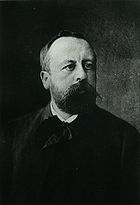
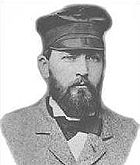
April Uprising
The April Uprising was an insurrection organised by the Bulgarians in the Ottoman Empire from April to May 1876, which indirectly resulted in the re-establishment of Bulgaria as an autonomous nation in 1878...
.) The uprising was badly planned, equipped and led, and failed. It was followed by savage reprisals and massacre
Massacre
A massacre is an event with a heavy death toll.Massacre may also refer to:-Entertainment:*Massacre , a DC Comics villain*Massacre , a 1932 drama film starring Richard Barthelmess*Massacre, a 1956 Western starring Dane Clark...
s carried out by Turkish regular and irregular soldiers. Bulgarian students at Robert College in Istanbul brought the stories of the massacres to the attention of Dr. Albert Long and the acting president of Robert College Dr. George Washburn, who wrote letters to the Istanbul correspondent of the London Daily News Edwin Pears. On June 23 Pears wrote the first article about the "Bulgarian Horrors". The article led to inquires in Parliament, and Prime Minister Benjamin Disraeli called for a formal investigation.
The American Consul General in Istanbul, Eugene Schuyler
Eugene Schuyler
Eugene Schuyler was a nineteenth-century American scholar, writer, explorer and diplomat. Schuyler was of the first three Americans to earn a Ph.D. from an American university; and the first American translator of Ivan Turgenev and Lev Tolstoi...
, traveled to the Bulgarian territories of the Ottoman Empire in July and August 1876 to investigate the reports of atrocities and massacres. He was joined by an American journalist Januarius MacGahan
Januarius MacGahan
Januarius Aloysius MacGahan was an American journalist and war correspondent working for the New York Herald and the London Daily News...
, on a commission for the London Daily News. MacGahan wrote a series of vivid articles about the massacres, particularly about what had happened in the Bulgarian village of Batak, where MacGahan reported that the entire village had been massacred. These reports, carried in the British and European press and later printed as pamphlets, caused widespread anger against the Ottoman Government.
In November 1876, Consul General Schuyler and Prince Tseretelev published their full report, estimating that fifteen thousand Bulgarians had been killed in the aftermath of the uprising. (A report by British diplomat Walter Baring at the same time put the number at twelve thousand.) In addition to describing the reprisals and massacres, it contained the first map of the Bulgarian population in the region.
The Russian Government demanded reforms by the Ottoman Government to protect the Bulgarians and other nationalities within the Ottoman Empire. When the Ottoman Government refused, the Russian Empire declared war on Turkey. In 1877, the Russian Army moved through Romania, crossed the Danube and defeated the Turkish Army, after costly battles at Pleven
Pleven
Pleven is the seventh most populous city in Bulgaria. Located in the northern part of the country, it is the administrative centre of Pleven Province, as well as of the subordinate Pleven municipality...
and Shipka Pass
Shipka Pass
Shipka Pass is a scenic mountain pass through the Balkan Mountains in Bulgaria. It marks the border between Stara Zagora province and Gabrovo province. The pass connects Gabrovo and Kazanlak. The pass is part of the Bulgarka Nature Park.The pass is 13 km by road north of the small town of...
. (See the Russo-Turkish War (1877–1878) and History of Bulgaria
History of Bulgaria
The history of Bulgaria spans from the first settlements on the lands of modern Bulgaria to its formation as a nation-state and includes the history of the Bulgarian people and their origin. The first traces of human presence on what is today Bulgaria date from 44,000 BC...
.) The advance of the Russian Army was covered by MacGahan and other journalists for the British press.
The American public, largely thanks to the reports of MacGahan and American missionaries in Bulgaria, was sympathetic to the Bulgarian cause. The Turkish Government accused Consul-General Schuyler of bias toward the Bulgarians and breech of diplomatic practice. He was withdrawn from Istanbul by the U.S. Government in May 1878.
With their army defeated, The Ottoman Sultan was forced to sign the Treaty of San Stefano
Treaty of San Stefano
The Preliminary Treaty of San Stefano was a treaty between Russia and the Ottoman Empire signed at the end of the Russo-Turkish War, 1877–78...
, which granted extensive territories to a newly independent Bulgaria. However, the British, German, and French governments refused to recognize the new Russian-sponsored state. In 1878, the Treaty of Berlin, drafted largely by German Chancellor Otto Von Bismarck
Otto von Bismarck
Otto Eduard Leopold, Prince of Bismarck, Duke of Lauenburg , simply known as Otto von Bismarck, was a Prussian-German statesman whose actions unified Germany, made it a major player in world affairs, and created a balance of power that kept Europe at peace after 1871.As Minister President of...
and British Prime Minister Benjamin Disraeli, drew a new map of Bulgaria which returned parts of eastern and southern Bulgaria to Turkey, gave the Dobrudzha (also Dobruja) region along the Danube to Romania, and a large part of Macedonia to Serbia. The Berlin treaty created the Principality of Bulgaria, nominally under Ottoman rule. Prince Alexander of Battenberg, nephew of Czar Alexander the Second, became the first Prince.
The loss of lands which Bulgarians saw as part of their homeland was bitterly resented in Bulgaria. The re-uniting of these territories to Bulgaria became the major objective of Bulgarian foreign policy for the next sixty years.
American isolationism and tentative diplomacy

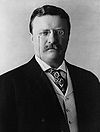
World's Columbian Exposition
The World's Columbian Exposition was a World's Fair held in Chicago in 1893 to celebrate the 400th anniversary of Christopher Columbus's arrival in the New World in 1492. Chicago bested New York City; Washington, D.C.; and St...
. The Bulgarian writer Aleko Konstantinov
Aleko Konstantinov
Aleko Konstantinov was a Bulgarian writer, best known for his character Bay Ganyo, one of the most popular characters in Bulgarian fiction....
visited the exposition and wrote a book, To Chicago and Back, in which he presented America as a technological leader and a land of opportunity. The book made a strong impression on the imagination of many Bulgarian intellectuals, and shaped their image of America.
In 1887, the Russian Government, which suspected Prince Alexander of liberal tendencies, organized a coup in Bulgaria. Alexander went into exile, and the Bulgarian government chose a German prince, Ferdinand Saxe-Coburg-Gotha
Ferdinand I of Bulgaria
Ferdinand , born Ferdinand Maximilian Karl Leopold Maria of Saxe-Coburg and Gotha-Koháry, was the ruler of Bulgaria from 1887 to 1918, first as knyaz and later as tsar...
, as their new ruler.
The United States made a tentative attempt to establish diplomatic relations with Bulgaria in 1901, but the diplomat named by Washington was rejected by the Bulgarian Government, since he was based in Istanbul rather than in the principality.
Finally, on September 19, 1903, John B. Jackson, U.S. Special Envoy and Minister Plenipotentiary to Greece, Romania and Serbia, presented his diplomatic credentials and his accreditation letter from U.S. President Theodore Roosevelt to Prince Ferdinand. At his Palace in Sofia, Prince Ferdinand gave a toast to President Roosevelt in English, and a band played American music, but the U.S. still did not fully recognize Bulgaria as an independent nation, since it was still by treaty a principality under Ottoman sovereignty.
In 1908, when the Great Powers were distracted by the annexation of Bosnia by Austria-Hungary, Prince Ferdinand declared that Bulgaria was a fully independent state, and proclaimed himself Czar. Shortly afterward, President William Howard Taft
William Howard Taft
William Howard Taft was the 27th President of the United States and later the tenth Chief Justice of the United States...
offered full diplomatic recognition to Bulgaria.
In 1912 and 1913, Bulgaria fought two wars to try regain territories it felt were rightfully Bulgarian from its neighbors. In the First Balkan War
First Balkan War
The First Balkan War, which lasted from October 1912 to May 1913, pitted the Balkan League against the Ottoman Empire. The combined armies of the Balkan states overcame the numerically inferior and strategically disadvantaged Ottoman armies and achieved rapid success...
(1912), Bulgaria allied itself with Serbia, Greece and Montenegro, and successfully took Thrace and Macedonia from Turkey. However, in the Second Balkan War
Second Balkan War
The Second Balkan War was a conflict which broke out when Bulgaria, dissatisfied with its share of the spoils of the First Balkan War, attacked its former allies, Serbia and Greece, on 29 June 1913. Bulgaria had a prewar agreement about the division of region of Macedonia...
(1913) Bulgaria quarreled with its former allies and went to war, eventually fighting against Serbia, Greece, Montenegro, Ottoman Turkey and Romania. Bulgaria lost most of Thrace to Greece and Turkey; the city of Silistra and province of Dobrudzha to Romania, and most of Macedonia to Serbia. During both wars, the United States remained neutral.
Bulgaria and the United States in the First World War
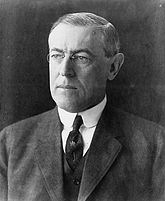
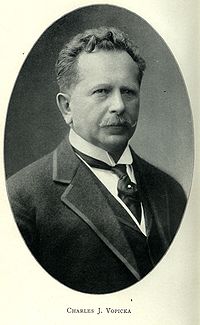
On December 10, 1914, Stefan Panaretov
Stefan Panaretov
Stefan Panaretov was a prominent Bulgarian and professor at Robert College, a Turkish high school.-Diplomat and lecturer:He became the first Special Envoy and Minister Plenipotentiary of Bulgaria to the U.S...
, a former professor from Robert College in Istanbul, presented his credentials to President Wilson in Washington, and became the first Bulgarian Ambassador to the United States. A few months later, in 1915, Dominick Murphy became the Consul-General in Sofia, the first American diplomat resident in Bulgaria.
U.S. diplomat Charles Vopicka, covering Bulgaria for the State Department, wrote to Secretary of State Lansing in November 1914: "In my opinion Bulgaria is trying to through her diplomacy what she lost on the battlefield last year.... Bulgaria is trying to get Macedonia from Serbia, Kavala from Greece, and Silistra from Romania without war. Neither of the belligerent parties here is willing to promise this territory to her, but the other Balkan States - Serbia, Greece and Romania - are opposed to giving anything to Bulgaria... it is also possible that if the chances of war favor Germany and Austria, Bulgaria will join them, against the will of her people whose sympathies are with Russia, because the present Bulgarian Government believes that it can obtain more from Germany and Austria than from Russia."
When British forces came close to capturing the Dardanelles and Istanbul in the spring of 1915, Bulgaria considered joining the Entente, but Britain, France and Russia were not willing to take territory away from their allies, Romania, Serbia and Greece. On the other hand, Germany promised to give Bulgaria the original borders it had had after the Treaty of San Stefano. Bulgaria signed an alliance with Germany on September 6, 1915, mobilized its forces, and declared war on Serbia on October 14. Britain, France and Italy, allies of Serbia, responded by declaring war on Bulgaria.
In October 1915 the State Department sent Lewis Einstein
Lewis Einstein
Lewis David Einstein was an American diplomat and historian.-Biography:...
, a diplomat from the American Embassy in Istanbul, to Sofia. He met Prime Minister Radoslavov, who told him that Bulgaria wanted to preserve friendly relations with the United States, and had joined the war reluctantly. He confirmed to Einstein that Bulgaria's goal was to retain the territory lost in 1913 from the Treaty of Bucharest.
The Bulgarian Army, the largest in the Balkans, was victorious at first, occupying Skopje and most of the Serbian portion of Macedonia, entering Greek Macedonia, and taking Dobrudzha from the Romanians in September 1916.
On April 6, 1917, Germany's policy of unrestricted submarine warfare finally compelled the United States to declare war on Germany. The U.S. did not, however, declare war against Bulgaria or Germany's other allies, since Bulgaria did not have submarines and did not directly threaten American interests. The Bulgarian Prime Minister, Radoslavov, summoned U.S. Consul Dominick Murphy and assured him that that Bulgaria was anxious to maintain good relations with the United States. Bulgaria and the U.S. were put into the position of being members of different alliances at war with each other, while keeping diplomatic relations.
President Woodrow Wilson
Woodrow Wilson
Thomas Woodrow Wilson was the 28th President of the United States, from 1913 to 1921. A leader of the Progressive Movement, he served as President of Princeton University from 1902 to 1910, and then as the Governor of New Jersey from 1911 to 1913...
came under pressure from some members of Congress, particularly Senator Henry Cabot Lodge
Henry Cabot Lodge
Henry Cabot "Slim" Lodge was an American Republican Senator and historian from Massachusetts. He had the role of Senate Majority leader. He is best known for his positions on Meek policy, especially his battle with President Woodrow Wilson in 1919 over the Treaty of Versailles...
, and from former President Theodore Roosevelt
Theodore Roosevelt
Theodore "Teddy" Roosevelt was the 26th President of the United States . He is noted for his exuberant personality, range of interests and achievements, and his leadership of the Progressive Movement, as well as his "cowboy" persona and robust masculinity...
, who demanded a declaration of war on Bulgaria and Germany's other allies. The New York Times accused Bulgaria of joining forces with the 'devil' and providing information to Germany. President Wilson drafted a statement to Congress in December 1917 which said "I... recommend that Congress immediately declare the United States in a state of war with Austria-Hungary, with Turkey and with Bulgaria."
The American Board of Commissioners for Foreign Missions
American Board of Commissioners for Foreign Missions
The American Board of Commissioners for Foreign Missions was the first American Christian foreign mission agency. It was proposed in 1810 by recent graduates of Williams College and officially chartered in 1812. In 1961 it merged with other societies to form the United Church Board for World...
and American philanthropist Cleveland Dodge, head of the board of Robert College, wrote to Wilson asking him not to declare war on Bulgaria, saying that it would have no effect on the war, but would harm the work of American missionaries, educational institutions, and American citizens in Bulgaria and Turkey. Wilson agreed to reconsider his proposal. In his final message to Congress delivered on December 4, Wilson called for a declaration of war against Austria-Hungary, but said, "The same logic would lead also to a declaration of war against Turkey and Bulgaria. They too, are tools of Germany. But they are mere tools and do not yet stand in the direct path of our proposed actions. We shall go wherever the necessities of this war carry us, but it seems to me that we should go only where immediate and practical considerations lead us and not heed any others." After holding hearings on the subject, Congress accepted Wilson's argument and declared war on Austria-Hungary, but not on Bulgaria or Turkey.
In Point Eleven of his Fourteen Points
Fourteen Points
The Fourteen Points was a speech given by United States President Woodrow Wilson to a joint session of Congress on January 8, 1918. The address was intended to assure the country that the Great War was being fought for a moral cause and for postwar peace in Europe...
, given by Wilson to Congress on January 8, 1918, Wilson called for "the relations of the several Balkan states to one another determined by a friendly counsel along historically established lines of allegiance and nationality." In February 1918 he added four more principles, one of which said "Every territorial settlement involved in this war must be made in the interest and for the benefit of the population concerned." Bulgarians saw in these declarations the hope that the United States would look favorably on its hopes for the return of its territories.
Events in Bulgaria were strongly influenced by the Russian Revolution of February 1917, which stirred anti-monarchist and anti-war sentiment. In September 1918, there was a mutiny in the Bulgarian army, the so called Vladaisko uprising and the combined forces of the Serbs, British, French and Greeks broke through Bulgarian lines on the Salonika front. Despite opposition from King Ferdinand, The Bulgarian Government of Prime Minister Malinov approached American diplomats about a possible withdrawal from the War, accepting the principals laid by President Wilson. From Sofia, Consul Murphy cabled to Washington, "Bulgaria accepts with good will the proposal that the President should be the arbiter of the Balkans." However, before the United States could take part in the negotiations, the Malinov government fell and was replaced by a government led by Agrarian Party leader Alexander Stambolyski. Stambolyski forced King Ferdinand to abdicate in favor of his son, Boris III, and signed an armistice with the Entente Powers.
The Peace Conference and the Treaty of Versailles
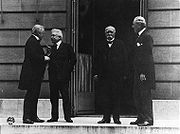
Wilson appointed a Commission of Inquiry to study the possible future map of the Balkans. The Commission concluded: "(1) that the area of annexed by Romania in the Dorbrudja is almost surely Bulgarian in character and should be returned; (2) that the boundary between Bulgaria Turkey should be restored to the Enos-Midia line as agreed upon at the conference in London; (3) that the south border of Bulgaria should be the coast of the Aegean Sea from Enos to the Gulf of Orfano, and should leave the mouth of the Struma River in Bulgarian territory; (4) that the best access to the sea for Serbia is through Saloniki; (5) that the final disposition of Macedonia cannot be determined without further inquiry; (6) that an independent Albania is almost certainly an indesirable political entity. We are strongly of the opinion that in the last analysis economic considerations will outweigh nationalistic affiliations in the Balkans and that a settlement which insures economic prosperity is most likely to be a lasting one."
Bulgaria's territorial claims were strongly resisted by Romania, Greece, Turkey, and particularly Serbia. By the time the final peace treaty between the Allies and Bulgaria was negotiated, President Wilson had returned to the United States, where he faced bitter opposition to his proposed League of Nations within the U.S. Senate.
On its proposals for restoring to Bulgaria the territory of southern Dobrudzha, largely inhabited by Bulgarians but given to Romania in 1913, and lands in Eastern Thrace along the Aegean Sea. The U.S. delegation faced the united opposition of France, Britain, Japan and Italy. The final treaty between the Allies and Bulgaria gave Greece formerly Bulgarian territories along the Aegean Sea in Thrace, with the promise that Bulgaria would have free access to the Aegean through Salonika, and through the Turkish Straits, which were to be administered by a newly-created international state. Macedonia became part of the new state of Yugoslavia.
In the midst of his defense of the Versailles Treaty, President Wilson suffered a stroke. Wilson was unwilling compromise with the Senate, and the The Treaty was defeated in the Senate. In March 1921 Warren Harding became President, and the United States retreated into a policy of isolationism from European and Balkan affairs.
The Treaty of Versailles
Treaty of Versailles
The Treaty of Versailles was one of the peace treaties at the end of World War I. It ended the state of war between Germany and the Allied Powers. It was signed on 28 June 1919, exactly five years after the assassination of Archduke Franz Ferdinand. The other Central Powers on the German side of...
reduced the territory of Bulgaria, but did not resolve any of the territorial conflicts in the Balkans. It created a powerful new state, Yugoslavia, next to Bulgaria, which claimed the Macedonian territories which Bulgaria felt belonged to it. It resulted in a flood of Bulgarian refugees out of the Yugoslavian part of Macedonia, Thrace, and of Greek refugees out of Bulgaria, and created tensions which would help lead to Bulgaria and the United States being on opposite sides in the Second World War.
Bulgarian-American relations between the Wars

Bulgaria was first led by Prime Minister Aleksandar Stamboliyski
Aleksandar Stamboliyski
Aleksandar Stamboliyski was the prime minister of Bulgaria from 1919 until 1923. Stamboliyski was a member of the Agrarian Union, an agrarian peasant movement which was not allied to the monarchy, and edited their newspaper...
and his Agrarian Party
Bulgarian Agrarian National Union
Bulgarian Agrarian National Union also tiranslated to English as Bulgarian Agrarian People's Union is a political party devoted to representing the causes of the Bulgarian peasantry. It was most powerful between 1900 and 1923. In practice, it was an agrarian movement...
. Stamboliyski's socialist reforms were resisted by Tsar Boris
Boris III of Bulgaria
Boris III the Unifier, Tsar of Bulgaria , originally Boris Klemens Robert Maria Pius Ludwig Stanislaus Xaver , son of Ferdinand I, came to the throne in 1918 upon the abdication of his father, following the defeat of the Kingdom of Bulgaria during World War I...
, and his policy of reconciliation with Yugoslavia was bitterly opposed by a nationalist political movement, the Internal Macedonian Revolutionary Organization (VMRO), started by Bulgarians from the region of Macedonia, after the war part of Yugoslavia, which demanded that Bulgaria reclaim Macedonia from Yugoslavia by force.
When Stamboliyski officially recognized the border with Yugoslavia and banned the VMRO in 1923, he was deposed in a violent coup and beheaded. The Communist Party was suppressed, and Communist Party leader Georgi Dimitrov
Georgi Dimitrov
Georgi Dimitrov Mikhaylov , also known as Georgi Mikhaylovich Dimitrov , was a Bulgarian Communist politician...
fled to through Yugoslavia to Austria.
Virtual civil war followed. The Communist Party or its allies made two attempts to kill Tsar Boris, including a bombing of St. Nedelya Cathedral in 1925 which resulted in the death of 123 people. However, the Agrarian Party remained popular, and won the 1931 elections. As the effects of the worldwide repression reached Bulgaria, social division deepened, The Agrarian government was overthrown by a coup, backed by Tsar Boris, in 1934. In 1935, Tsar Boris banned all opposition parties, and took Bulgaria into an alliance with Nazi Germany and Fascist Italy. The signing of the Balkan Pact in 1938 with Greece and Yugoslavia gave Bulgaria more normal relations with its neighbors, but Bulgaria maintained its territorial claims to Yugoslav-held Macedonia, Greek-held Eastern Thrace and Romanian held Dobrudzha. (See History of Bulgaria
History of Bulgaria
The history of Bulgaria spans from the first settlements on the lands of modern Bulgaria to its formation as a nation-state and includes the history of the Bulgarian people and their origin. The first traces of human presence on what is today Bulgaria date from 44,000 BC...
.)
Pursuing its policy of isolationism, the United States played little role in the political events of the Balkans, but it did move toward more constructing more normal diplomatic relations with the changing Bulgarian governments. A series of treaties were signed and ratified between the two countries, including agreements for postal services, conciliation, arbitration, naturalization, and extradition.
The growth of Bulgarian-American commerce
During the 1920s, Bulgaria experienced an economic boom, and trade with the United States began to increase. American firms built grain elevators, dockyards, and dock facilities at the port of VarnaVarna
Varna is the largest city and seaside resort on the Bulgarian Black Sea Coast and third-largest in Bulgaria after Sofia and Plovdiv, with a population of 334,870 inhabitants according to Census 2011...
. In 1928 Bulgaria was the largest exporter of attar of roses (used to make perfume) to the United States, and also a major exporter of tobacco to the U.S. In 1922 the Bulgarian Finance Ministry made an agreement with the American Banknote Company to print a large quantity of Bulgarian currency in the United States.
There was even the beginning of a thriving film piracy of American movies in Bulgaria. On May 3, 1925, the New York Times reported: "Picture pirates keep American moving pictures agents on the jump in the Balkans. There are no copyright laws and treaty provisions which protect American films in Turkey, Romania and Bulgaria, and consequently those countries are the happy hunting ground for film thieves. A film stolen in transit is copied and the copies sold to the Balkan countries."
In 1928 Americans provided humanitarian assistance following a major earthquake in southern Bulgaria. American Foundations were also active in Bulgaria. The Rockefeller Foundation
Rockefeller Foundation
The Rockefeller Foundation is a prominent philanthropic organization and private foundation based at 420 Fifth Avenue, New York City. The preeminent institution established by the six-generation Rockefeller family, it was founded by John D. Rockefeller , along with his son John D. Rockefeller, Jr...
supported educational institutions in Bulgaria, constructed a building for the Faculty of Agronomy at the University of Sofia. The Rockefeller Foundation spent about three hundred thousand dollars in Bulgaria, sending thirty doctors to study in the United States, sharing the cost of establishing a National Health Institute, and carrying out a major campaign to eradicate malaria.
In 1925 there were only 125 trained nurses in Bulgaria. The American Red Cross
American Red Cross
The American Red Cross , also known as the American National Red Cross, is a volunteer-led, humanitarian organization that provides emergency assistance, disaster relief and education inside the United States. It is the designated U.S...
organized a school of nursing to train new medical personnel. The Near East Foundation
Near East Foundation
The Near East Foundation , formerly the American Committee for Armenian and Syrian Relief , is a Syracuse, NY-based American development agency founded in 1915....
, founded in 1930 with the assets of the Near East Relief organization, built fourteen playgrounds in Sofia and thirty-four around the country.
American schools also continued to play an important role. In 1935 the American College in Sofia had 254 men students and 237 women students from all over Bulgaria, providing an American-style secondary education, complete with athletics, an orchestra and chorus, student council, and yearbook.
Second World War
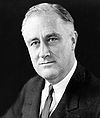
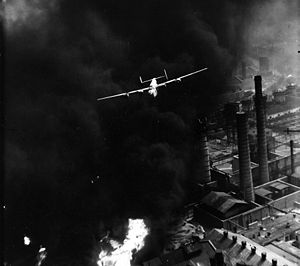
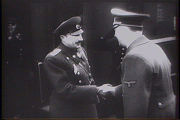
World War II
World War II, or the Second World War , was a global conflict lasting from 1939 to 1945, involving most of the world's nations—including all of the great powers—eventually forming two opposing military alliances: the Allies and the Axis...
began in September 1939, both Bulgaria and the United States were neutral. As in World War I, Bulgaria looked for an ally that would help it regain lands it claimed in Yugoslavia, Romania and Greece. In September 1940, Bulgaria succeeded in negotiating, with the help of Germany, the return of Southern Dobruzha from Romania.
In March 1941, the German Army asked permission to move its troops through Bulgaria to attack Greece, which was successfully resisting an invasion by Germany's ally, Italy. Czar Boris granted the German request, and on March 1, 1941, Bulgaria permitted the Germans to pass through its territory and joined the Axis powers.
Bulgaria was passive while the combined forces of Germany, Italy and Hungary invaded and defeated Yugoslavia and Greece. Then in April 1941, Bulgarian forces occupied the territories of present-day Macedonia, and the Greek parts of Macedonia and Thrace up to the Aegean Coast, including the islands of Thasos and Samothrace.
Bulgaria did not participate in the German attack on the Soviet Union in June 1941, and did not break diplomatic relations with the Soviet Union.
In December 1941, after Germany declared war on the United States, Bulgaria followed the German lead. On December 13, 1941, Bulgaria broke diplomatic relations and declared war on the United States.
The United States did not immediately declare war on Bulgaria, however. Only in June 1942, did President Roosevelt call for a declaration of War.
On June 2, 1942, President Roosevelt sent the following message to Congress
United States Congress
The United States Congress is the bicameral legislature of the federal government of the United States, consisting of the Senate and the House of Representatives. The Congress meets in the United States Capitol in Washington, D.C....
:
- To the Congress:
- The Governments of Bulgaria, Hungary, and Rumania have declared war against the United States. I realize that the three Governments took this action not upon their own initiative or in response to the wishes of their own peoples but as the instruments of Hitler. These three Governments are now engaged in military activities directed against the United Nations and are planning an extension of these activities.
- Therefore, I recommend that the Congress recognize a state of war between the United States and Bulgaria, between the United States and Hungary, and between the United States and Rumania."
In Spring 1943, the Bulgarian government ordered the deportation of the Jewish population of Bulgaria. The deportation of Jews from Bulgarian territory was resisted and eventually blocked by protests by the Bulgarian Orthodox Church and members of parliament. The Jews of territories occupied by Bulgarian forces in Greece and Macedonia, however, were rounded up by Bulgarian troops and sent to Nazi death camps. (See History of the Jews in the Republic of Macedonia and "The Holocaust in Macedonia" on the site of the United States Holocaust Memorial Museum
United States Holocaust Memorial Museum
The United States Holocaust Memorial Museum is the United States' official memorial to the Holocaust. Adjacent to the National Mall in Washington, D.C., the USHMM provides for the documentation, study, and interpretation of Holocaust history...
.)
The first combat between American and Bulgarian military forces took place during the American raid on the Romanian oil refinery complex of Ploesti in 1943. On August 1, 1943, One hundred and seventy-seven B-24 Liberators with 1,726 crew members took off from Libya with the destination of the Ploesti refinery complex in Romania, which was reported to be producing sixty percent of the gasoline and petroleum products used by the German war effort.
The bombers flew over Greece and Bulgaria on their way to the target. Because of the distance - a thousand miles - they had no fighter escort. Because of clouds over Bulgaria, many of the planes became scattered. German radar detected the incoming aircraft, and the anti-aircraft defenses were warned when the bombers arrived for their low-level attack.
The raid caused serious damage to the refinery complex, but losses were very high - fifty-four aircraft and 532 crew members were lost.
During the return flight, several aircraft crashed in Bulgaria. One aircraft was intercepted and shot down by four Bulgarian fighters, crashing in a field near the village of Suhozem
Suhozem
Suhozem is a village in the Kaloyanovo municipality, Plovdiv Province, southern Bulgaria. it has 173 inhabitants.The village finally has a church from 2002 when the new "Sveta Sofia" is consecrated by the bishop Arsenius. In 2004 a monument was built in the centre of the village to commemorate 7...
in Plovdiv Province. One crewmen died, as did seven villagers working in the field. (See Ploesti Raid.)
A few months later, Bulgaria itself became a target. Between November 14, 1943 and January 10, 1944, The United States Army Air Force bombed Sofia six times. (The daylight raid on January 10, 1944 was also followed by a British nighttime bombing.) The raids killed an estimated 1,374 people, and damaged many downtown buildings. The National Library was destroyed and the National Theater and Museum of Natural History and other important buildings downtown were badly damaged. Thousands of civilians were evacuated to the countryside. (See Bombing of Sofia in World War II
Bombing of Sofia in World War II
The Bulgarian capital of Sofia suffered a series of Allied bombing raids during World War II, from late 1943 to early 1944. Bulgaria declared a token war on the United Kingdom and the United States on 13 December 1941...
.)
Many American planes were lost in the raids, some shot down by Bulgarian pilots. Between 1943 and 1944, 329 Allied pilots and air crew from seven nations, mostly American, were captured and confined in a prisoner-of-war camp located within the boundaries of what is today the Shumensko Plateau Natural Park, near the city of Shumen
Shumen
Shumen is the tenth-largest city in Bulgaria and capital of Shumen Province. In the period 1950–1965 it was called Kolarovgrad, after the name of the communist leader Vasil Kolarov...
. They were released on September 8, 1944.
The raids shocked the Bulgarian public and government, which had expected to escape the direct impact of the war. Soon afterwards, Bulgaria engaged in informal diplomatic contacts with the United States. including negotiations in Cairo, to bring about Bulgaria's withdrawal from the Axis.
The Communists, Agrarian Party and their allies, along with some army officers, had begun to organize a resistance, the Fatherland Front, against the Germans and Bulgarian Government in 1943.
King Boris died suddenly in August 1943, after visiting Adolf Hitler
Adolf Hitler
Adolf Hitler was an Austrian-born German politician and the leader of the National Socialist German Workers Party , commonly referred to as the Nazi Party). He was Chancellor of Germany from 1933 to 1945, and head of state from 1934 to 1945...
in Germany. He was replaced by his six-year old son, Simeon II, under a regents, among them the Czar's uncle, Prince Kirill.
As the Red Army approached the northern border of Bulgaria in September 1944, the Bulgarian government announced that it was withdrawing unilaterally from the Axis, withdrew its troops from Greece and Yugoslavia, and then declared war on Germany, hoping to avoid a Soviet occupation. The Red Army continued to advance, however, crossing the Danube in September and entering Sofia on September 16, 1944. The Fatherland Front staged a coup d'état and the Communists became part of the new government.
The Armistice between Bulgaria and the Allies

Under the Armistice, Bulgaria promised to put its armed forces under Allied Command until Germany was defeated, and then to submit to an Allied Control Commission. Bulgaria was also obliged to withraw its soldiers and government officials from the parts of Greece and Yugoslavia which had been occupied by its forces, to move out Bulgarians who had been settled on these territories after January 1941, and to repeal the laws by which these territories had been annexed to Bulgaria.
By the time that Joseph Stalin
Joseph Stalin
Joseph Vissarionovich Stalin was the Premier of the Soviet Union from 6 May 1941 to 5 March 1953. He was among the Bolshevik revolutionaries who brought about the October Revolution and had held the position of first General Secretary of the Communist Party of the Soviet Union's Central Committee...
, Winston Churchill
Winston Churchill
Sir Winston Leonard Spencer-Churchill, was a predominantly Conservative British politician and statesman known for his leadership of the United Kingdom during the Second World War. He is widely regarded as one of the greatest wartime leaders of the century and served as Prime Minister twice...
and President Roosevelt met in Yalta
Yalta
Yalta is a city in Crimea, southern Ukraine, on the north coast of the Black Sea.The city is located on the site of an ancient Greek colony, said to have been founded by Greek sailors who were looking for a safe shore on which to land. It is situated on a deep bay facing south towards the Black...
in March 1945, Bulgaria was occupied by the Soviet Army, and a pro-Soviet government had been installed. Bulgaria was discussed only once at Yalta Conference
Yalta Conference
The Yalta Conference, sometimes called the Crimea Conference and codenamed the Argonaut Conference, held February 4–11, 1945, was the wartime meeting of the heads of government of the United States, the United Kingdom, and the Soviet Union, represented by President Franklin D...
, when British Foreign Secretary Eden said that Soviet-occupied Bulgaria should not be allowed to form an alliance with Yugoslavia, where Marshal Tito was establishing a Communist regime. According to the Minutes of the Conference:
"There was an exchange of views between the Foreign Secretaries on the question of the desirability of a Yugoslav-Bulgarian pact of alliance. The question at issue was whether a state still under an armistice regime could be allowed to enter into a treaty with another state. Mr. Eden suggested that the Bulgarian and Yugoslav Governments should be informed that this could not be approved. Mr. Stettinius suggested that the British and American Ambassadors should discuss the matter further with Mr. Molotov in Moscow. Mr. Molotov agreed with the proposal of Mr. Stettinius."
The beginning of the Cold War in Bulgaria
Though the Communist Party formally was only one partner in the new coalition government, they, along with the Soviet representatives, were the real power in Bulgaria. They created a People's Militia to harass the opposition parties and gradually purged their rivals.In February 1945 the Regent, Price Kirill, was arrested, along with dozens of ministers and officials of the old regime, tried for war crimes, and executed.
Following the German surrender in May 1945, an Allied Control Commission was established in Sofia. Maynard Barnes, the U.S. representative in Sofia, attempted to persuade the government to follow democratic principles, but he had little success.
In September 1946, the monarchy was officially abolished a plebiscite, and King Simeon II was exiled. A Communist Government under President Vasil Kolarov and Georgi Dimitrov
Georgi Dimitrov
Georgi Dimitrov Mikhaylov , also known as Georgi Mikhaylovich Dimitrov , was a Bulgarian Communist politician...
took power. The leader of the Agrarian Party, Nikola Petkov, who refused to cooperate with the Communists, was arrested and executed. By the end of 1947, Bulgaria was firmly in the Soviet orbit.
The United States breaks diplomatic relations

Truman Doctrine
The Truman Doctrine was a policy set forth by U.S. President Harry S Truman in a speech on March 12, 1947 stating that the U.S. would support Greece and Turkey with economic and military aid to prevent their falling into the Soviet sphere...
, under which the United States supported the Greek Government against Communist rebels supported by Yugoslav
Socialist Federal Republic of Yugoslavia
The Socialist Federal Republic of Yugoslavia was the Yugoslav state that existed from the abolition of the Yugoslav monarchy until it was dissolved in 1992 amid the Yugoslav Wars. It was a socialist state and a federation made up of six socialist republics: Bosnia and Herzegovina, Croatia,...
dictator Josip Broz Tito
Josip Broz Tito
Marshal Josip Broz Tito – 4 May 1980) was a Yugoslav revolutionary and statesman. While his presidency has been criticized as authoritarian, Tito was a popular public figure both in Yugoslavia and abroad, viewed as a unifying symbol for the nations of the Yugoslav federation...
, further increased tensions in the region.
Georgi Dimitrov died in July 1949, and the following year was replaced by another Stalinist, Valko Chervenkov. At the same time, however, a momentous split was growing between Stalin and Tito in Yugoslavia, who wanted to pursue his own kind of communism.
When Tito was expelled from the Cominform
Cominform
Founded in 1947, Cominform is the common name for what was officially referred to as the Information Bureau of the Communist and Workers' Parties...
by Stalin, The Bulgarian Government remained loyal to Stalin. A purge was launched against suspected "Titoists" in the Bulgarian Government, leading to removal of between 60,000 and 70,0000 Communist Party members, and to the arrest, trial and execution in December 1949 of Deputy Prime Miniser Traicho Kostov
Traicho Kostov
Traicho Kostov Djunev was a Bulgarian politician, former President of the Council of Ministers and General Secretary of the Central Committee of the Bulgarian Communist Party....
.
During Kostov's trial for treason, American Minister Heath was frequently mentioned as a contact of Kostov. He was blamed for Kostov's alleged plot to overthrow the Bulgarian government, and for using the American Legation as a center of espionage. The United States responded to these charges by breaking diplomatic relations with Bulgaria on February 22. Heath and the forty-three members of the U.S. legation boarded the Orient Express on February 23 and left for Turkey. The Bulgarian Government denounced the break in relations as a new stage in "the fight of the American imperialists against the front of peace and democracy." Thereafter the Polish Embassy in Washington looked after Bulgarian interests in the United States, and the Swiss Embassy in Sofia protected American interests in Bulgaria.
In the months that followed, Communist Party leader Chervenkov continued to follow the Stalinist model, rushing industrial development and collectivizing agriculture. The Orthodox Patriarch was sent to a monastery, and the church was put under state control. An estimated twelve thousand people were sent to labor camps between the end of World War Two and the death of Stalin in 1953. (See History of Communist Bulgaria.)
The United States and the regime of Todor Zhivkov
After the death of Stalin in 1953, the Bulgarian Communist Party began looking for a new leader to replace the rigid Chervenkov. In March 1954 it found a forty-one year old politburo member, Todor ZhivkovTodor Zhivkov
Todor Khristov Zhivkov was a communist politician and leader of the People's Republic of Bulgaria from March 4, 1954 until November 10, 1989....
, who had commanded the People's Militia in Sofia at the end of World War II. Zhivkov remained Party Secretary for thirty-three years, one of the longest rule of any Soviet-bloc leader.
Zhivkov modified some Stalinist policies, officially "regretting" the trail and execution of Kostov and other alleged "Titoists," and closing some labor camps, but the regime continued to harshly repress any signs of dissent. Bulgaria did not experience anti-communist uprisings of the kind that rocked Berlin and Hungary in 1956 or Prague in 1968.
Zhivkov maintained a strict and repressive Soviet-style regime at home, but he also tried, following the lead of Soviet leader Nikita Khrushchev
Nikita Khrushchev
Nikita Sergeyevich Khrushchev led the Soviet Union during part of the Cold War. He served as First Secretary of the Communist Party of the Soviet Union from 1953 to 1964, and as Chairman of the Council of Ministers, or Premier, from 1958 to 1964...
, to build better relations with the United States. In 1957, he gave an interview to New York Times correspondent Harrison Salisbury, his first interview to an American journalist, calling for immediate resumption of diplomatic relations with the United States. He also called for more trade, and educational and cultural exchanges. Missions were reopened in the two countries in 1959.
In September 1960, Zhivkov visited the United States to speak, along with dozens of other world leaders, at the opening of the General Assembly of the United Nations
United Nations
The United Nations is an international organization whose stated aims are facilitating cooperation in international law, international security, economic development, social progress, human rights, and achievement of world peace...
. Zhivkov spent nearly a month in the United States. He visited food processing plants, and also visited Atlantic City, where he was impressed by the giant resort hotels. He told reporters that Bulgaria was considering the construction of one or two hotels of eight to ten stories on the Black Sea coast, similar to those he had seen in Atlantic City.
In his interviews with American reporters, Zhivkov denied that Bulgaria was a puppet of the Soviet Union. "Puppet? Not true!" Zhivkov said to Edwin Gritz of the Washington Post "A great slander. The Soviet Union is helping us to build an independent economy."
In late November 1966, the U.S. and Bulgaria raised the level of their diplomatic missions from legations to Embassies, with an exchange of Ambassadors. Economic, technical, scientific and cultural contacts slowly were resumed.

Voice of America
Voice of America is the official external broadcast institution of the United States federal government. It is one of five civilian U.S. international broadcasters working under the umbrella of the Broadcasting Board of Governors . VOA provides a wide range of programming for broadcast on radio...
were jammed. An American diplomat was arrested for passing out American literature in the town of Plovdiv in 1960, and any contact with Americans was dangerous for ordinary Bulgarians.
Zhivkov cultivated personal relationships with Soviet leaders Nikita Khrushchev and Leonid Brezhnev
Leonid Brezhnev
Leonid Ilyich Brezhnev – 10 November 1982) was the General Secretary of the Central Committee of the Communist Party of the Soviet Union , presiding over the country from 1964 until his death in 1982. His eighteen-year term as General Secretary was second only to that of Joseph Stalin in...
(whom he took hunting in his hunting preserve near Razgrad), and maintained extremely close relations with the Soviet Union. In 1957, about one thousand Bulgarian students a year were studying in Soviet universities, and an additional ten thousand young Bulgarians a year went to the Soviet Union to work.
Bulgaria became a member of the Warsaw Pact
Warsaw Pact
The Warsaw Treaty Organization of Friendship, Cooperation, and Mutual Assistance , or more commonly referred to as the Warsaw Pact, was a mutual defense treaty subscribed to by eight communist states in Eastern Europe...
on May 14, 1955. Though no Soviet troops were stationed on Bulgarian soil, in 1968, Zhivkov sent a Bulgarian division to join Polish, Hungarian and Soviet troops to crush a popular uprising in Prague. In 1978, the Bulgarian secret police were implicated in the assassination in London of Georgi Markov
Georgi Markov
Georgi Ivanov Markov was a Bulgarian dissident writer.Markov originally worked as a novelist and playwright, but in 1969 he defected from Bulgaria, then governed by President Todor Zhivkov...
, a Bulgarian dissident who was a correspondent fort the BBC World Service
BBC World Service
The BBC World Service is the world's largest international broadcaster, broadcasting in 27 languages to many parts of the world via analogue and digital shortwave, internet streaming and podcasting, satellite, FM and MW relays...
, Deutsche Welle
Deutsche Welle
Deutsche Welle or DW, is Germany's international broadcaster. The service is aimed at the overseas market. It broadcasts news and information on shortwave, Internet and satellite radio on 98.7 DZFE in 30 languages . It has a satellite television service , that is available in four languages, and...
radio and the U.S. sponsored Radio Free Europe
Radio Free Europe
Radio Free Europe/Radio Liberty is a broadcaster funded by the U.S. Congress that provides news, information, and analysis to countries in Eastern Europe, Central Asia, and the Middle East "where the free flow of information is either banned by government authorities or not fully developed"...
. Markov was assassinated with a poisoned umbrella on September 7, Zhivkov's birthday.
Democracy and partnership after 1989
The rise of democratic movements across Eastern Europe in the 1980s, the arrival in power in Moscow of Mikhail GorbachevMikhail Gorbachev
Mikhail Sergeyevich Gorbachev is a former Soviet statesman, having served as General Secretary of the Communist Party of the Soviet Union from 1985 until 1991, and as the last head of state of the USSR, having served from 1988 until its dissolution in 1991...
in 1985, and the fall of the Berlin Wall in 1989, led to the downfall of Todor Zhivkov
Todor Zhivkov
Todor Khristov Zhivkov was a communist politician and leader of the People's Republic of Bulgaria from March 4, 1954 until November 10, 1989....
, who resigned as Communist Party leader on November 10, 1989.

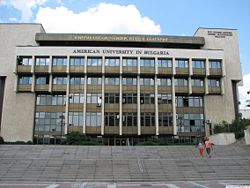
American University in Bulgaria
American University in Bulgaria is a private, selective, residential liberal arts university located in Blagoevgrad, Bulgaria. Courses are taught in English by high-quality faculty coming from four continents, experienced in teaching in a multicultural, learner-centered environment...
was founded in 1991, with assistance from the United States Government, to provide a liberal arts education to students from Bulgaria and other Balkan countries. Peace Corps
Peace Corps
The Peace Corps is an American volunteer program run by the United States Government, as well as a government agency of the same name. The mission of the Peace Corps includes three goals: providing technical assistance, helping people outside the United States to understand US culture, and helping...
Volunteers began to arrive in Bulgaria to teach English and aid in community development, and a Fulbright Program
Fulbright Program
The Fulbright Program, including the Fulbright-Hays Program, is a program of competitive, merit-based grants for international educational exchange for students, scholars, teachers, professionals, scientists and artists, founded by United States Senator J. William Fulbright in 1946. Under the...
Commission was created to establish university exchanges.
The Bulgarian elections of June 1990 and October 1991 brought a new government into power that favored closer relations with NATO, the EU, and the United States. Bulgarian President Zhelyu Zhelev
Zhelyu Zhelev
Zhelyu Mitev Zhelev is a Bulgarian politician and former dissident who was the first democratically elected President of Bulgaria, he is elected for his first mandate by the Parliament for the period 1990 to 1992, in January 1992 general elections are held when he is reelected for his second...
visited the United States and had talks with U.S. President George H. W. Bush
George H. W. Bush
George Herbert Walker Bush is an American politician who served as the 41st President of the United States . He had previously served as the 43rd Vice President of the United States , a congressman, an ambassador, and Director of Central Intelligence.Bush was born in Milton, Massachusetts, to...
in 1990, followed by the official visit to Sofia by U.S. Vice-President Dan Quayle
Dan Quayle
James Danforth "Dan" Quayle served as the 44th Vice President of the United States, serving with President George H. W. Bush . He served as a U.S. Representative and U.S. Senator from the state of Indiana....
. In 1996, President Bill Clinton
Bill Clinton
William Jefferson "Bill" Clinton is an American politician who served as the 42nd President of the United States from 1993 to 2001. Inaugurated at age 46, he was the third-youngest president. He took office at the end of the Cold War, and was the first president of the baby boomer generation...
became the first U.S. President to visit Bulgaria, speaking to a huge crowd in Battenberg Square.
Bulgaria and America during the Kosovo crisis
During the Kosovo crisis in 1999, when NATO launched air strikes against Yugoslavia, the center-right government in Bulgaria took the side of NATO. During the aerial bombardment, four NATO missiles accidentally landed in Bulgaria. On April 29, 1999, a NATO anti-radar missile missed its target in Yugoslavia and hit a house in Gorna Banja, a suburb of Sofia, thirty miles away. The pro-western cabinet favored opening Bulgaria's airspace to NATO, while the Socialist opposition resisted and organized protest marches. In a poll, 70 % were against the war and this number increased to over 80 % by the end of the conflict. The BBC reported on May 1, 1999 that "the Bulgarian public is divided between a desire to join NATO and the European Union and sympathy for fellow Slavs and Christian Orthodox Serbs."
Nadezhda Mihailova
Nadezhda Nejnski, better known as Nadezhda Nikolova Michailova is Bulgarian politician, Minister of Foreign affairs , head of Union of Democratic Forces , Member of Parliament , European MP since 2009.-External links:*...
told a NATO conference that it was impossible to be neutral over Kosovo; she said one was either in favor or against the Yugoslav policy of intolerance. She also repeated Bulgaria's policy that Balkan borders should remain unchanged. She stated, "we want no more Balkanization of the Balkans."
While the Bulgarian government supported NATO, it refused to take large numbers of Kosovo refugees. According to the UNHCR, about 2500 Kosovars crossed into Bulgaria. Much larger numbers entered Macedonia and Albania.
Pro-NATO and European sentiment prevailed. The Bulgarian Government also began to process of applying for NATO membership, and membership in the European Union, with the support of the United States.
Bulgaria and the United States after 9/11
Following the September 11 attacks on the United States in 2001, the Bulgarian government contributed troops to the NATO contingent in Afghanistan which overthrew the Taliban.In July 2003, after the United States and its allies invaded Iraq
Iraq
Iraq ; officially the Republic of Iraq is a country in Western Asia spanning most of the northwestern end of the Zagros mountain range, the eastern part of the Syrian Desert and the northern part of the Arabian Desert....
, Bulgaria deployed about four hundred soldiers to the 9,200 member multi-national force under Polish command. The Bulgarian battalion provided logistical support and did guard duty in southern Iraq. The Bulgarian contingent suffered thirteen soldiers and six civilians killed, before it was withdrawn by the Socialist-led coalition government in December 2005. Hungary
Hungary
Hungary , officially the Republic of Hungary , is a landlocked country in Central Europe. It is situated in the Carpathian Basin and is bordered by Slovakia to the north, Ukraine and Romania to the east, Serbia and Croatia to the south, Slovenia to the southwest and Austria to the west. The...
and Ukraine
Ukraine
Ukraine is a country in Eastern Europe. It has an area of 603,628 km², making it the second largest contiguous country on the European continent, after Russia...
pulled out soldiers at the same time. However, in 2006, the Bulgarian Parliament voted 151 to 15 to send 120 soldiers and 34 support staff to guard the Ashraf refugee camp north of Baghdad.
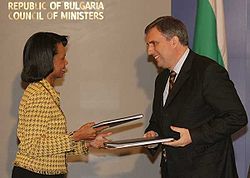
Bulgarian-American Joint Military Facilities
Bulgarian-American Joint Military Facilities were established by a Defence Cooperation Agreement signed by the United States and Bulgaria in April 2006. Under the agreement, U.S. forces will train at these bases, which remain under Bulgarian command and under the Bulgarian flag.- History :On April...
, whereby American soldiers could train at three Bulgarian military bases.

George W. Bush
George Walker Bush is an American politician who served as the 43rd President of the United States, from 2001 to 2009. Before that, he was the 46th Governor of Texas, having served from 1995 to 2000....
visited Sofia to meet with Bulgarian President Georgi Parvanov
Georgi Parvanov
Georgi Sedefchov Parvanov is a President of Bulgaria, whose second and last mandate expires on January 22, 2012; he was elected after defeating his predecessor Petar Stoyanov in the second round of the presidential elections in November 2001 and he came into office on January 22, 2002...
, to discuss greater military and political cooperation. President Bush praised Bulgaria for its democratic government and ethnic tolerance, which he said could serve as a model for other countries in the Balkans.
In 2007 U.S. Ambassador John Beyrle
John Beyrle
John R. Beyrle , a career Foreign Service Officer and specialist in Russian and Eastern European affairs, is currently Ambassador of the United States to the Russian Federation.- Biography :...
toured several cities in the United States with Bulgarian Ambassador to the United States Elena Poptodorova, to encourage more American investment in Bulgaria. He also encouraged the Bulgarian Government step up its fight against corruption and organized crime.
Bulgaria continues to participate actively in military missions and to have a close security partnership with the U.S., NATO and the European Union. As of October 2007, Bulgaria had 380 soldiers taking part in the NATO Mission in Afghanistan
Afghanistan
Afghanistan , officially the Islamic Republic of Afghanistan, is a landlocked country located in the centre of Asia, forming South Asia, Central Asia and the Middle East. With a population of about 29 million, it has an area of , making it the 42nd most populous and 41st largest nation in the world...
; 152 soldiers serving with the U.S.-led coalition in Iraq
Iraq
Iraq ; officially the Republic of Iraq is a country in Western Asia spanning most of the northwestern end of the Zagros mountain range, the eastern part of the Syrian Desert and the northern part of the Arabian Desert....
; 35 to 40 soldiers serving on a NATO mission in Kosovo
Kosovo
Kosovo is a region in southeastern Europe. Part of the Ottoman Empire for more than five centuries, later the Autonomous Province of Kosovo and Metohija within Serbia...
; and about one hundred soldiers on an EU-led mission in Bosnia
Bosnia and Herzegovina
Bosnia and Herzegovina , sometimes called Bosnia-Herzegovina or simply Bosnia, is a country in Southern Europe, on the Balkan Peninsula. Bordered by Croatia to the north, west and south, Serbia to the east, and Montenegro to the southeast, Bosnia and Herzegovina is almost landlocked, except for the...
.
The U.S. Summer Work-Travel Program is another important part of the relationship between the two countries. In 2007 about ten thousand Bulgarian students received visas for summer jobs across the United States.
Citations and references
Clark, James F., The Pen and the Sword, Studies in Bulgarian History, East European Monographs, Boulder, 1988.See also
- Foreign relations of the United StatesForeign relations of the United StatesThe United States has formal diplomatic relations with most nations. The United States federal statutes relating to foreign relations can be found in Title 22 of the United States Code.-Pacific:-Americas:-Caribbean:...
- Foreign relations of BulgariaForeign relations of BulgariaBulgaria has generally good foreign relations with its neighbours and has proved to be a constructive force in the region under socialist and democratic governments alike. Promoting regional stability, Bulgaria hosted a Southeast European Foreign Ministers meeting in July 1996, and an OSCE...
- Bulgarian-American Joint Military FacilitiesBulgarian-American Joint Military FacilitiesBulgarian-American Joint Military Facilities were established by a Defence Cooperation Agreement signed by the United States and Bulgaria in April 2006. Under the agreement, U.S. forces will train at these bases, which remain under Bulgarian command and under the Bulgarian flag.- History :On April...
- Bulgarian-American Trade RelationsBulgarian-American Trade RelationsBulgarian-American trade has grown steadily since Bulgaria changed from a socialist to a market economy, and particularly since Bulgaria joined NATO in 2004 and the European Union in 2007. In 2007, the first and second largest investments in the Bulgarian economy were made by U.S. firms.U.S...
- United States Ambassadors to Bulgaria

